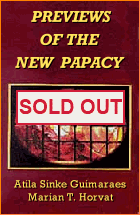Traditionalist Issues
 |
 |
 |
 |
 |
 |
 |
An Omissive, Authoritarian Leadership,
Eager to Compromise
I would like to support what I affirmed in my last article by showing how the statements and actions of the current SSPX leadership are completely contrary to what Arch. Lefebvre clearly stated. And even if Arch. Lefebvre did not explicitly speak about some of them, these changes are in grave opposition to the common good of the Society and to basic common sense. …
The need for a practical agreement
… The leaders advocate an absolute need for a practical agreement with the current authorities, but without any prior doctrinal agreement, thus contradicting what Arch. Lefebvre had explicitly stated, especially after 1988, and what the General Chapter (which, let us remind Menzingen, has more authority than Bishop Fellay) decided in 2006. Their present search for a purely practical agreement is all the more surprising when one considers that the recent doctrinal discussions between our Theological Commission and the Vatican came to the conclusion that a doctrinal agreement with the Conciliar Church is impossible!
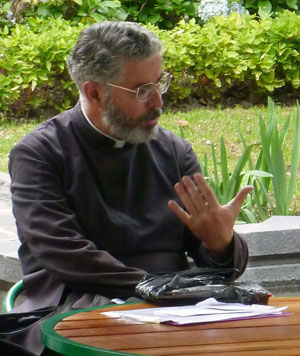 Therefore, for the Society to search for a purely practical agreement with present-day Rome, which continues to be in error, is equivalent to committing an "operation suicide: " We will be "absorbed" by the Conciliar Church, with all its structure not only rooted in the Council, but working to implement the conciliar and post-conciliar reforms. We know what happened to the eight traditional communities who rallied to this Conciliar Church without a preliminary doctrinal accord; inevitably the same thing can be expected to happen to us...
Therefore, for the Society to search for a purely practical agreement with present-day Rome, which continues to be in error, is equivalent to committing an "operation suicide: " We will be "absorbed" by the Conciliar Church, with all its structure not only rooted in the Council, but working to implement the conciliar and post-conciliar reforms. We know what happened to the eight traditional communities who rallied to this Conciliar Church without a preliminary doctrinal accord; inevitably the same thing can be expected to happen to us...
Arch. Lefebvre clearly placed first and foremost, especially after the consecrations of Bishops, a solution to the doctrinal question as a prerequisite to any future dialogue with the Conciliar Church,: “I will place the question on the doctrinal level: Do you agree with the great encyclicals of all the Popes who preceded you ... Are you in full communion with these Popes and with their affirmations? Do you still accept the Anti-Modernist Oath? Are you in favor of the Social Reign of Our Lord Jesus Christ? If you do not accept the doctrine of your predecessors, it is useless to speak. As long as you do not agree to reform the Council considering the doctrine of the Popes who preceded you, there is no dialogue possible. It is useless. Thus the positions will be clearer.”(Fideliter, n. 66, Nov-Dec 1988, p. 12-13)
The illusion of 'doing a greater good’
Then, in order to find a "positive" justification for negotiating with conciliar Rome, the SSPX authorities affirm that this purely practical agreement will allow us to do a greater good, for, being "inside the visible Church" they will convert the Conciliar Church to Tradition... This is exactly the same argument invoked by Dom Gérard and the priests of Campos to justify their reunion with the conciliar Rome!
Our Founder answered this deceptively "optimistic" perspective with great realism in an interview, saying, “Getting inside the Church, what does it mean? And, first of all, which Church are we speaking about? If this is about the Conciliar Church should we, who have fought against it for 20 years because we want the Catholic Church, return to the Conciliar Church supposedly to make it Catholic? This is a total illusion! Inferiors do not change superiors, but superiors change inferiors.”(Fideliter n. 70 July-August 1989)
And the facts show us that the little good that those who rallied to Rome since 1988 have done does not justify the greater evil they have done by abandoning their faithful to the conciliar errors, to the new Mass, to justifications of the actions of the post-conciliar popes, etc...
Are the preliminary conditions sufficient?
Again, in order to justify this agreement, they affirm that the preliminary conditions set by the last General Chapter in July 2012, would be sufficient to avoid falling into the same “traps” as the rallied communities did.
But apart from the fact that these conditions are insufficient and unrealistic to protect us from being "assimilated" and "neutralized" by the Conciliar Church, the General Chapter has forgotten the two most important conditions, clearly requested by Arch. Lefebvre: the conversion of the official authorities of the Church, namely, by their explicit condemnation of conciliar errors, and exemption from the New Code of Canon Law.
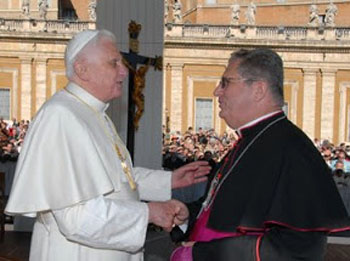 Arch. Lefebvre said that even if modernist Rome granted us some preliminary conditions, such conditions would be insufficient to make an agreement with them. Here is what he said to Card. Ratzinger: “Your Eminence, look, even if you give us a Bishop, even if you give us some autonomy from the Bishops, even if you give us the entire liturgy of 1962, if you give us to continue the seminaries and the Society as we do now, we cannot work together, it's impossible, impossible, because we work in two diametrically opposed directions: you work for the de-Christianization of society, of the human person and the Church and we, we are working to Christianize. We cannot agree.” (Retreat at Ecône, September 4, 1987)
Arch. Lefebvre said that even if modernist Rome granted us some preliminary conditions, such conditions would be insufficient to make an agreement with them. Here is what he said to Card. Ratzinger: “Your Eminence, look, even if you give us a Bishop, even if you give us some autonomy from the Bishops, even if you give us the entire liturgy of 1962, if you give us to continue the seminaries and the Society as we do now, we cannot work together, it's impossible, impossible, because we work in two diametrically opposed directions: you work for the de-Christianization of society, of the human person and the Church and we, we are working to Christianize. We cannot agree.” (Retreat at Ecône, September 4, 1987)
In addition, Arch. Lefebvre put the conversion of Rome as a prerequisite to an agreement when he addressed these words to the four future bishops: “… being confident that without delay the See of Peter will be occupied by a perfectly Catholic Successor of Peter, in which hands you could deposit the grace of your episcopate in order that he confirms it.” (August 29, 1987)
And concerning the Code of Canon Law, how could we keep our identity by continuing our combat, if we are under the common law of the Conciliar Church, which is the New Code of Canon Law? Don’t they see that the new code was specifically made to implement the conciliar reforms, but not to preserve tradition?
Vatican II could be acceptable!
And in order to overcome the doctrinal impasse that results from the Second Vatican Council and the post-conciliar “magisterium,” we have seen these SSPX leaders in their recent conferences, their sermons and their interviews show an explicit and repeated determination to minimize the conciliar errors in order to prepare the minds of the faithful for reconciliation with conciliar Rome.
Did we not hear with stupefaction Bishop Fellay, in an interview with Catholic News Service, state that, “The Council is presenting a religious liberty which in fact was a very, very limited one, very limited,” and also that the conclusion of doctrinal discussions with Rome was that “… we see that many things which we would have condemned as being from the Council are in fact not from the Council, but the common understanding of it.”! And: “the Council must be put within this great tradition of the Church, must be understood within this, and in correlation to it. These are statements we fully agree with, totally, absolutely.” (May 11, 2012)
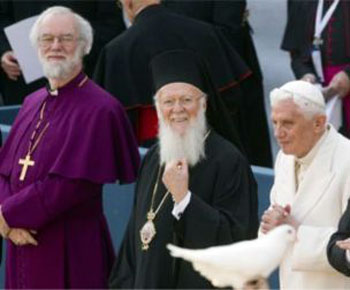 And the only (incomplete) revealed text concerning their last doctrinal preamble presented in Rome in April, and spoken of by Fr. Pfluger in a conference, not only betrays the same desire to minimize the conciliar errors but even to accept them: “…the entire Tradition of the Catholic Faith should be the criterion and the guide of understanding of the teachings of Vatican II, which in turn illuminates some aspects of the life and doctrine of the Church, implicitly present in it, not yet formulated.”(St Joseph des Carmes, June 5, 2012)
And the only (incomplete) revealed text concerning their last doctrinal preamble presented in Rome in April, and spoken of by Fr. Pfluger in a conference, not only betrays the same desire to minimize the conciliar errors but even to accept them: “…the entire Tradition of the Catholic Faith should be the criterion and the guide of understanding of the teachings of Vatican II, which in turn illuminates some aspects of the life and doctrine of the Church, implicitly present in it, not yet formulated.”(St Joseph des Carmes, June 5, 2012)
Was it not the fact that they passively observed the interfaith meeting of Assisi III without vigorously condemning it, even asking some members of the Society not to do so, also a revealing sign?
And, what is of more concern is that their minimization of the errors of the Council seems to come from a while back… as Bishop Fellay already stated back in 2001 (!) in an interview that: “To accept the Council, we do not have a problem. ..This gives the impression that we reject all of Vatican II. However, we keep 95% of it.”(Swiss newspaper La Liberté, 11 May 2001)
Instead of listening to the repeated warnings, asking them not to sign a practical agreement, they contemptuously replied to the letter of the three Bishops with harsh words... insinuating that these fellow Bishops were “sede-vacantists,”“schismatics “and were transforming the errors of Vatican II into “super heresies.”
The list would be too long to enumerate the other statements of Menzingen, which move in the direction of a weakening on their doctrinal positions; the same weakening is found among other members of the Society who support the agreement. I have seen how some confreres, who I knew as once being firm in their condemnation of the Council and of the post-conciliar Popes, hold now “softer” positions and are very supportive of a rally to Modernist Rome...
Grave errors against prudence
In addition to the errors in their principles, we can also note serious errors of judgment, which were also the cause of the most serious internal division, in depth and extension, which the Society has ever known.
By imprudent actions, they have preferred to sacrifice the unity and the common good of the Society to follow the agenda of the modernist Rome, as they have stated in their answer to the letter of the three other Bishops of the Society: “For the common good of the Society we would prefer by far the current solution of the status quo, but obviously Rome does not tolerate it anymore.” (14 April 2012)
Bishop Fellay has also stated that it was almost "inevitable" that a part of the Society would not follow in case of an agreement with Rome: “I cannot exclude that there might be a split [within the Society].”(Interview to Catholic News Service). And thus he took the risk of gravely dividing the Society.
Therefore, they preferred to ignore all the warnings coming from the three other Bishops, from some superiors and members of the Society and even from our fellow Traditional communities who asked them not to sign a purely practical agreement.
This attitude has deeply shocked many members of the Society and created an internal division that has seriously undermined the leadership’s credibility to govern it, and among friendly communities undermined a confidence that has not been restored.
Who duped whom?
When we hear their explanations (excuses?) during the last months concerning the supposedly “real reasons” which have led them so far in the concessions to Modernist Rome, we see that it is not so much the Roman authorities who have deceived them, but rather that they have deceived themselves! For if they have decided, imprudently, to ignore the answers they got from the official Vatican channels about the true thinking of the Pope and to favor other channels, so-called “informal” ones, such a decision does not improve their reputation as prudent superiors...
Thus they refused to see that everything these “unofficial” channels said to them was either gossip or manipulation, because their desire to reach an agreement became so much an “obsession.” So they finished by believing everything! Who’s guilty? They alone!
How is it possible that they could act so carelessly in a such a serious matter? In any institution, even a secular one, such an act leads inevitably to the resignation of the person responsible, because too much trust has been lost. “We will take the responsibility,” as Fr. Pfluger threatened to do if the agreements will fail.
Actually, if they have not resigned, it is because they continue to believe in an agreement. They have not yet learned a lesson from their actions! It is obvious that, despite some obstacles, Menzingen and the Vatican will do everything to “resuscitate” the talks. The expulsion of Bishop Williamson appears clearly as a “telltale sign” that the talks will resume, because the expulsion was, at least for the Vatican, a sine qua non condition in favor of a deal.
In addition, we find in Bishop Fellay a grave lack of practical judgment about the Pope’s false ideas. How could he think that Benedict XVI would be ready in recognizing us “to put aside our acceptance of the Council,” as he wrote to him in June 2012? Did he not know that the Council is “non-negotiable” for Modernist Rome? Is this naivety on his part, or is he simply believing his desires to be reality? In any case, in this he shows that he gravely lacks prudence in doctrinal matters.
Unjust persecutions
Finally, to complete their blindness and their stubbornness on the path of “reconciliation” with modernist Rome, they have undertaken persecutions in order to suppress any opposition, both inside and outside the Society. Since then we have seen a series of intimidations, admonitions, mutations, delays in Holy Orders, expulsions of priests and even of one of our Bishops!
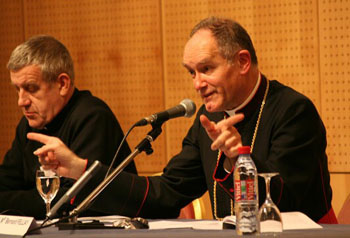 They relentlessly persecute and expel people who oppose their reunification with Modernist Rome, and at the same time they say cynically that they intend to continue their opposition ... inside the Official Church once they have been recognized!
They relentlessly persecute and expel people who oppose their reunification with Modernist Rome, and at the same time they say cynically that they intend to continue their opposition ... inside the Official Church once they have been recognized!
In the final analysis, they have established an authoritarian government, a real dictatorship, in the Society, in order to remove any obstacle opposing their plans of reuniting with Modernist Rome.
Thus, Bishop Fellay and his two assistants have radically changed the fundamental principles and objectives of the Society established by our Founder. They have also ignored major decisions of the General Chapter of 2006, which forbade a practical agreement with the Official Church without previous doctrinal agreement. They wittingly ignored the warnings of prudent people who counseled them not to make any practical agreement with Modernist Rome. They have jeopardized the unity and the common good of the Society by exposing it to a danger of compromising with the enemies of the Church. And finally, they contradict themselves by saying the opposite of what they affirmed only a few years ago!
Therefore, they have betrayed the legacy of Arch. Lefebvre, the responsibilities of their positions, the trust of thousands and even of those who, deceived by them, continue to trust them.
They have shown a resolute willingness to lead the Society, at all costs, to rally to our enemies.
Regardless of whether the agreement with the Conciliar Church has not yet been done, or will not take place immediately, or perhaps never... a grave danger remains for the Society, because they have not retracted the false principles that have guided their destructive actions.
I see now sadly that, by wanting somehow to identify abusively their judgments and their decisions with the Society itself, they have ultimately confiscated it as if it were their personal property, forgetting that they were only appointed to serve for a determined time.
May God have pity on the Society!

Posted December 14, 2012
The need for a practical agreement
… The leaders advocate an absolute need for a practical agreement with the current authorities, but without any prior doctrinal agreement, thus contradicting what Arch. Lefebvre had explicitly stated, especially after 1988, and what the General Chapter (which, let us remind Menzingen, has more authority than Bishop Fellay) decided in 2006. Their present search for a purely practical agreement is all the more surprising when one considers that the recent doctrinal discussions between our Theological Commission and the Vatican came to the conclusion that a doctrinal agreement with the Conciliar Church is impossible!

Fr. Ortiz sets out his strong objections to the doctrinal compromises
Arch. Lefebvre clearly placed first and foremost, especially after the consecrations of Bishops, a solution to the doctrinal question as a prerequisite to any future dialogue with the Conciliar Church,: “I will place the question on the doctrinal level: Do you agree with the great encyclicals of all the Popes who preceded you ... Are you in full communion with these Popes and with their affirmations? Do you still accept the Anti-Modernist Oath? Are you in favor of the Social Reign of Our Lord Jesus Christ? If you do not accept the doctrine of your predecessors, it is useless to speak. As long as you do not agree to reform the Council considering the doctrine of the Popes who preceded you, there is no dialogue possible. It is useless. Thus the positions will be clearer.”(Fideliter, n. 66, Nov-Dec 1988, p. 12-13)
The illusion of 'doing a greater good’
Then, in order to find a "positive" justification for negotiating with conciliar Rome, the SSPX authorities affirm that this purely practical agreement will allow us to do a greater good, for, being "inside the visible Church" they will convert the Conciliar Church to Tradition... This is exactly the same argument invoked by Dom Gérard and the priests of Campos to justify their reunion with the conciliar Rome!
Our Founder answered this deceptively "optimistic" perspective with great realism in an interview, saying, “Getting inside the Church, what does it mean? And, first of all, which Church are we speaking about? If this is about the Conciliar Church should we, who have fought against it for 20 years because we want the Catholic Church, return to the Conciliar Church supposedly to make it Catholic? This is a total illusion! Inferiors do not change superiors, but superiors change inferiors.”(Fideliter n. 70 July-August 1989)
And the facts show us that the little good that those who rallied to Rome since 1988 have done does not justify the greater evil they have done by abandoning their faithful to the conciliar errors, to the new Mass, to justifications of the actions of the post-conciliar popes, etc...
Are the preliminary conditions sufficient?
Again, in order to justify this agreement, they affirm that the preliminary conditions set by the last General Chapter in July 2012, would be sufficient to avoid falling into the same “traps” as the rallied communities did.
But apart from the fact that these conditions are insufficient and unrealistic to protect us from being "assimilated" and "neutralized" by the Conciliar Church, the General Chapter has forgotten the two most important conditions, clearly requested by Arch. Lefebvre: the conversion of the official authorities of the Church, namely, by their explicit condemnation of conciliar errors, and exemption from the New Code of Canon Law.

Bishop Rifan's betrayal led to every compromise, including concelebrating a Mass in June 2011
In addition, Arch. Lefebvre put the conversion of Rome as a prerequisite to an agreement when he addressed these words to the four future bishops: “… being confident that without delay the See of Peter will be occupied by a perfectly Catholic Successor of Peter, in which hands you could deposit the grace of your episcopate in order that he confirms it.” (August 29, 1987)
And concerning the Code of Canon Law, how could we keep our identity by continuing our combat, if we are under the common law of the Conciliar Church, which is the New Code of Canon Law? Don’t they see that the new code was specifically made to implement the conciliar reforms, but not to preserve tradition?
Vatican II could be acceptable!
And in order to overcome the doctrinal impasse that results from the Second Vatican Council and the post-conciliar “magisterium,” we have seen these SSPX leaders in their recent conferences, their sermons and their interviews show an explicit and repeated determination to minimize the conciliar errors in order to prepare the minds of the faithful for reconciliation with conciliar Rome.
Did we not hear with stupefaction Bishop Fellay, in an interview with Catholic News Service, state that, “The Council is presenting a religious liberty which in fact was a very, very limited one, very limited,” and also that the conclusion of doctrinal discussions with Rome was that “… we see that many things which we would have condemned as being from the Council are in fact not from the Council, but the common understanding of it.”! And: “the Council must be put within this great tradition of the Church, must be understood within this, and in correlation to it. These are statements we fully agree with, totally, absolutely.” (May 11, 2012)

Benedict praying with false religions at Assisi
Was it not the fact that they passively observed the interfaith meeting of Assisi III without vigorously condemning it, even asking some members of the Society not to do so, also a revealing sign?
And, what is of more concern is that their minimization of the errors of the Council seems to come from a while back… as Bishop Fellay already stated back in 2001 (!) in an interview that: “To accept the Council, we do not have a problem. ..This gives the impression that we reject all of Vatican II. However, we keep 95% of it.”(Swiss newspaper La Liberté, 11 May 2001)
Instead of listening to the repeated warnings, asking them not to sign a practical agreement, they contemptuously replied to the letter of the three Bishops with harsh words... insinuating that these fellow Bishops were “sede-vacantists,”“schismatics “and were transforming the errors of Vatican II into “super heresies.”
The list would be too long to enumerate the other statements of Menzingen, which move in the direction of a weakening on their doctrinal positions; the same weakening is found among other members of the Society who support the agreement. I have seen how some confreres, who I knew as once being firm in their condemnation of the Council and of the post-conciliar Popes, hold now “softer” positions and are very supportive of a rally to Modernist Rome...
Grave errors against prudence
In addition to the errors in their principles, we can also note serious errors of judgment, which were also the cause of the most serious internal division, in depth and extension, which the Society has ever known.
By imprudent actions, they have preferred to sacrifice the unity and the common good of the Society to follow the agenda of the modernist Rome, as they have stated in their answer to the letter of the three other Bishops of the Society: “For the common good of the Society we would prefer by far the current solution of the status quo, but obviously Rome does not tolerate it anymore.” (14 April 2012)
Bishop Fellay has also stated that it was almost "inevitable" that a part of the Society would not follow in case of an agreement with Rome: “I cannot exclude that there might be a split [within the Society].”(Interview to Catholic News Service). And thus he took the risk of gravely dividing the Society.
Therefore, they preferred to ignore all the warnings coming from the three other Bishops, from some superiors and members of the Society and even from our fellow Traditional communities who asked them not to sign a purely practical agreement.
This attitude has deeply shocked many members of the Society and created an internal division that has seriously undermined the leadership’s credibility to govern it, and among friendly communities undermined a confidence that has not been restored.
Who duped whom?
When we hear their explanations (excuses?) during the last months concerning the supposedly “real reasons” which have led them so far in the concessions to Modernist Rome, we see that it is not so much the Roman authorities who have deceived them, but rather that they have deceived themselves! For if they have decided, imprudently, to ignore the answers they got from the official Vatican channels about the true thinking of the Pope and to favor other channels, so-called “informal” ones, such a decision does not improve their reputation as prudent superiors...
Thus they refused to see that everything these “unofficial” channels said to them was either gossip or manipulation, because their desire to reach an agreement became so much an “obsession.” So they finished by believing everything! Who’s guilty? They alone!
How is it possible that they could act so carelessly in a such a serious matter? In any institution, even a secular one, such an act leads inevitably to the resignation of the person responsible, because too much trust has been lost. “We will take the responsibility,” as Fr. Pfluger threatened to do if the agreements will fail.
Actually, if they have not resigned, it is because they continue to believe in an agreement. They have not yet learned a lesson from their actions! It is obvious that, despite some obstacles, Menzingen and the Vatican will do everything to “resuscitate” the talks. The expulsion of Bishop Williamson appears clearly as a “telltale sign” that the talks will resume, because the expulsion was, at least for the Vatican, a sine qua non condition in favor of a deal.
In addition, we find in Bishop Fellay a grave lack of practical judgment about the Pope’s false ideas. How could he think that Benedict XVI would be ready in recognizing us “to put aside our acceptance of the Council,” as he wrote to him in June 2012? Did he not know that the Council is “non-negotiable” for Modernist Rome? Is this naivety on his part, or is he simply believing his desires to be reality? In any case, in this he shows that he gravely lacks prudence in doctrinal matters.
Unjust persecutions
Finally, to complete their blindness and their stubbornness on the path of “reconciliation” with modernist Rome, they have undertaken persecutions in order to suppress any opposition, both inside and outside the Society. Since then we have seen a series of intimidations, admonitions, mutations, delays in Holy Orders, expulsions of priests and even of one of our Bishops!

Whoever does not agree with me will be put out
In the final analysis, they have established an authoritarian government, a real dictatorship, in the Society, in order to remove any obstacle opposing their plans of reuniting with Modernist Rome.
Thus, Bishop Fellay and his two assistants have radically changed the fundamental principles and objectives of the Society established by our Founder. They have also ignored major decisions of the General Chapter of 2006, which forbade a practical agreement with the Official Church without previous doctrinal agreement. They wittingly ignored the warnings of prudent people who counseled them not to make any practical agreement with Modernist Rome. They have jeopardized the unity and the common good of the Society by exposing it to a danger of compromising with the enemies of the Church. And finally, they contradict themselves by saying the opposite of what they affirmed only a few years ago!
Therefore, they have betrayed the legacy of Arch. Lefebvre, the responsibilities of their positions, the trust of thousands and even of those who, deceived by them, continue to trust them.
They have shown a resolute willingness to lead the Society, at all costs, to rally to our enemies.
Regardless of whether the agreement with the Conciliar Church has not yet been done, or will not take place immediately, or perhaps never... a grave danger remains for the Society, because they have not retracted the false principles that have guided their destructive actions.
I see now sadly that, by wanting somehow to identify abusively their judgments and their decisions with the Society itself, they have ultimately confiscated it as if it were their personal property, forgetting that they were only appointed to serve for a determined time.
May God have pity on the Society!

Posted December 14, 2012
______________________
______________________











